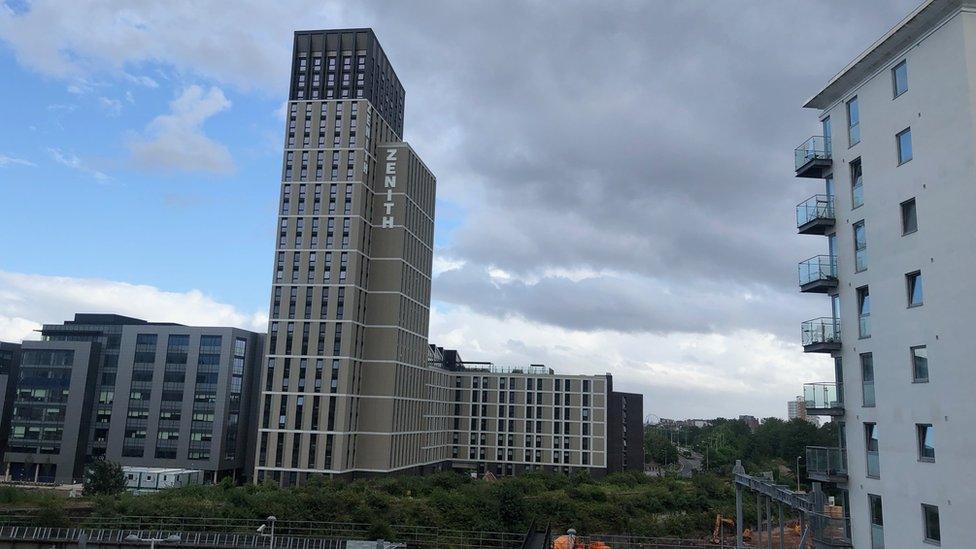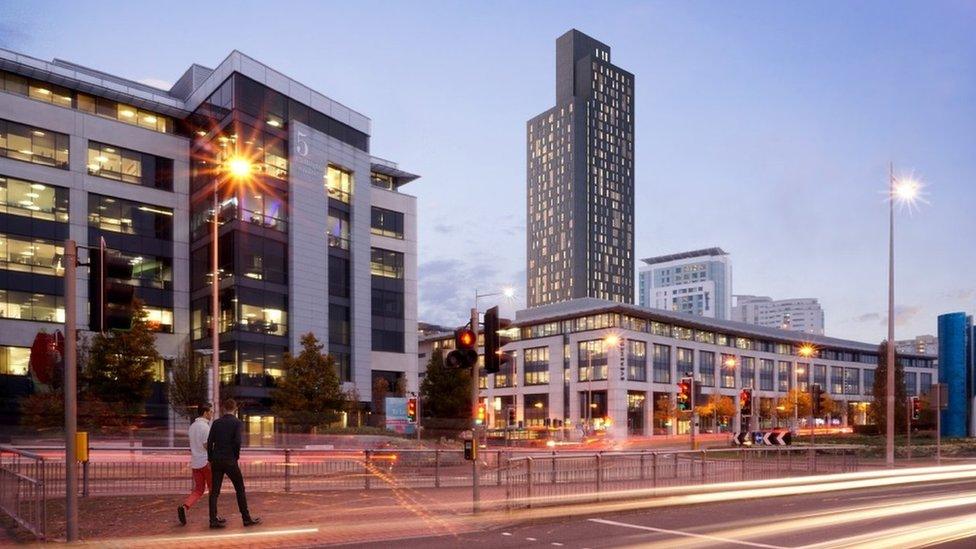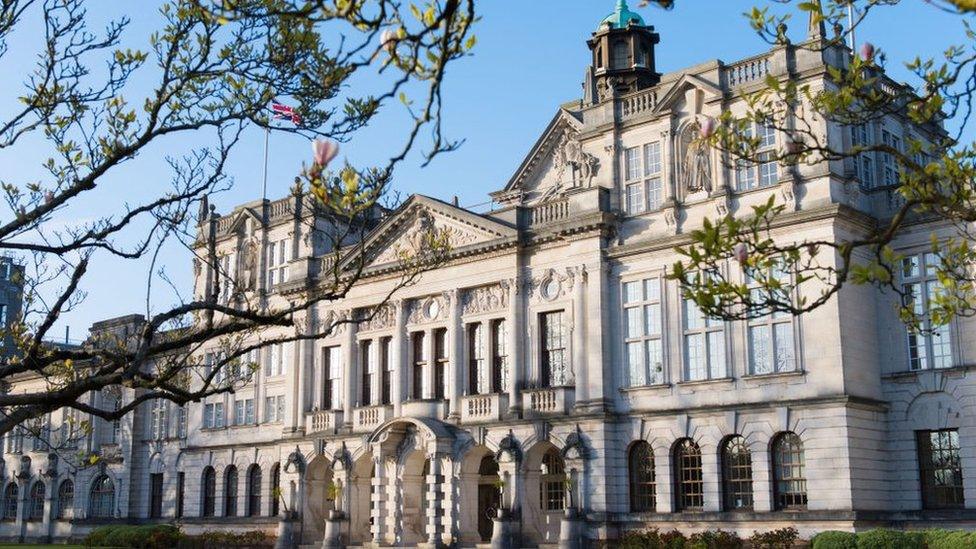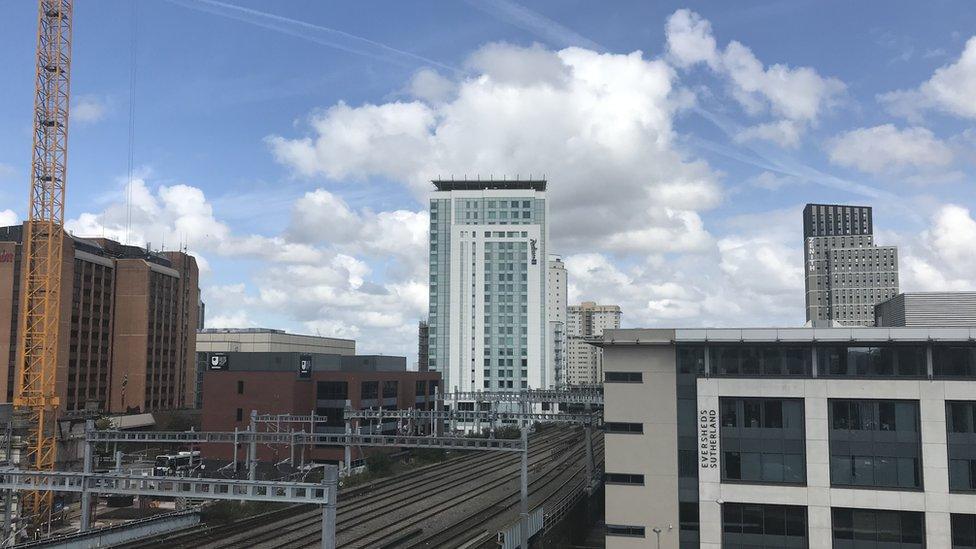Coronavirus: Rush to convert empty Cardiff student flats
- Published

The 25-storey Zenith development has 675 rooms, but managers say the crisis could result in many beds remaining empty
A fall in international students due to the coronavirus pandemic could leave Cardiff with a surplus of empty student flats, developers have warned.
Universities are predicting fewer students will start in September.
Managers of a number of private student developments have now said they will be in financial difficulty unless they can let to non-students.
One property expert said there was an "oversupply of high-end student rooms" and some could go into administration.
In recent years, a number of purpose-built student accommodation blocks (PBSAs) have been granted permission to be built in the city, with many aimed at international students and marketed as investment opportunities, including for pension schemes.
Before the pandemic hit, there were claims developers were exploiting the planning system, after a number were allowed to let to non-students.
Student flats: Are there too many in Cardiff's skyline?
Since the start of the pandemic, managers of three PBSAs in the city have applied to temporarily let rooms to non-students.
The Zenith development, granted temporary change of use to let 401 beds as serviced apartments in 2018, has applied to let to non-students again.
Property managers Fusion Students said coronavirus had caused an "unprecedented degree of disruption" in the sector.
Managing director Adam Cohen said there could be "markedly fewer students arriving for the new term" and the company would be under "substantial financial strain" if beds were left empty.
Collegiate, which has applied for change of use at both the PBSAs it manages in Cardiff, said "booking had virtually ground to a halt" since universities closed in March.
It said with Chinese students making up 30% of the market, any restrictions on travel and immigration "could result in a significant shortfall in applications".
'Some may go into administration'

The planned tallest building in Wales, housing hundreds of students, is yet to be built despite having permission
Since 2017, plans to create about 7,500 new privately managed student rooms have been approved by Cardiff council.
Property advisor David Feeney, of Cushman and Wakefield, said while the market was lucrative, the city was already struggling with an oversupply of "very high-end flats".
"If we are going to see a one-year hit to international recruitment, then that demand supply ratio becomes even more difficult, even if for just one year," he said, adding some schemes may go into administration due to the shortfall.
"Long term, we are very positive about a bounce back, the fundamentals show that the sector is still very attractive to international students."
But he said the situation was changing constantly and the true picture would not be seen until September.

Are empty student rooms the solution for homeless beds?

Student housing could be turned into homeless accommodation
Cardiff council has applied to its own planning committee to change one student development into homeless accommodation for the next five years to help in the aftermath of the pandemic.
The block, on Newport Road, Adamsdown, is currently run by Pobl housing association, and would be leased by the authority to provide rooms for 46 rough sleepers.
A report showed the council had concerns over where to house a growing number of homeless people - due to early prison releases, and being unable to "sofa surf" during the pandemic.
It had paid an estimated £917,287 for 130 rooms, external in two hotels to get people in off the streets and keep them safe during lockdown, but hopes to get the cash from the Welsh Government.
The council said the use of the student accommodation would "help alleviate the immediate impact of the crisis and form part of the recovery to close the hotels".


PBSAs are classed as "sui generis" in planning terms, meaning they are treated differently from other types of accommodation and standards for space are often lower.
It means it can be costly for developers to turn them into long-term residential accommodation, leading to fears last year they may end up empty or have to be demolished.
The Welsh Government had been due to consult on changing building regulations so all new builds, including student homes, would have to be big enough to turn into social housing.
This has been delayed due to coronavirus.
The British Property Federation (BPF) has called for changes to planning policy to allow student flats to be changed quickly to avoid financial difficulties and to house key workers during the pandemic.
It said some private landlords were struggling financially, external, after many waived fees for students who had returned home during the pandemic, but faced picking up the council tax bills for the empty rooms.
While students are exempt from council tax, when a room becomes empty, the management company must pay. The BPF said this could see companies "punished further" for waiving fees.
BPF vice president Stewart Moore said while PBSAs were seeing more bookings as lockdown began to be eased and students made decisions, the industry had a "hard 12 months" ahead.
Mr Moore, chief executive of CRM Students, which manages blocks in Cardiff, said 20% of staff had been furloughed and many schemes would need to make tough choices if international students chose to defer this year.
But he said with students concerned about living in traditional house shares due to the virus, self-contained flats could be the solution for many.
Can you answer six basic questions about coronavirus in the UK?
Choose an option for each question below to reveal the answers.

What information do we collect from this quiz? Privacy notice.
- Published29 April 2020

- Published31 May 2020

- Published12 April 2020

- Published3 September 2019

- Published2 January 2017
